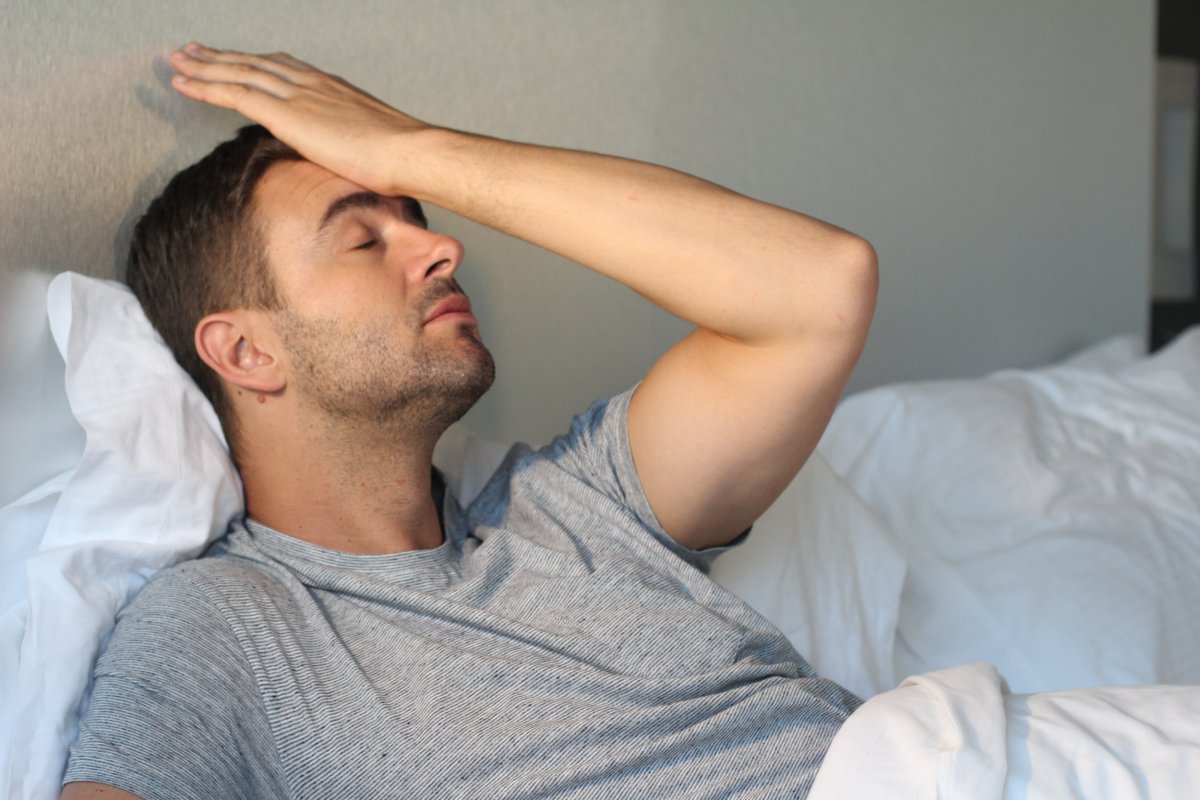Night sweats—episodes of heavy sweating during sleep that soak through pajamas or bedding—can affect people at various points in their lives. Night sweats are often associated with menopause in women. But men are also susceptible to the condition, for a variety of reasons.
Research on the prevalence of night sweats is limited, but a study published by the Maryland-based National Library of Medicine found that 41 percent of people had experienced recent night sweats, while another National Library of Medicine study of patients over 64 found that 10 percent reported being bothered more regularly by night sweats. Understanding some of the causes can help men appreciate when their symptoms are nothing to worry about—and when they need to see their doctor.
While many of us can feel overheated in a warm bedroom, night sweats are a more extreme reaction that can cause those experiencing them to wake up with drenched sheets. The latter is more likely to indicate a health problem.
A range of medical conditions have been associated with night sweats in men, including sleep apnea, acid reflux, and low testosterone. Autoimmune diseases and some forms of cancer are two other causes of extreme sweating at night.

Yet, identifying the cause can be elusive, said James Mold, a retired family practitioner and professor emeritus in family and preventive medicine at the Oklahoma University College of Medicine.
"Because causation is so difficult to prove, and most proposed causes can not be tested easily in randomized controlled experiments, nearly all of the commonly proposed causes of night sweats are, at best, associations, at worst anecdotal," he told Newsweek.
Fevers, as well as overeating and drinking too close to bedtime, can also contribute to night sweats, as can the use of selective serotonin reuptake inhibitor (SSRI) therapy for depression or anxiety, Mold said. Corticosteroids and hypoglycemic agents used to treat diabetes have also been linked to night sweats.
Symptoms Hard to Pinpoint
In a 2012 review in the Journal of the American Board of Family Medicine, Mold and two co-authors found that there was only limited research into the physiological mechanisms that might be associated with night sweats in particular.
In addition, there was little agreement within studies on how night sweats should be defined.
It's unclear whether they have to be frequent or severe, whether they have to only occur at night to be counted, and even if they are different from the hot flashes that many menopausal women suffer, he said.
According to Mold, a good example of this difficulty involves sleep apnea.
While there are many reasons why the condition might cause night sweats, both survey data and actual sleep recordings suggested that any arousal from sleep, no matter what the cause, can lead to sweating.
Although middle-aged men aged 45 to 64 are most prone to night sweats, they can occur at any age.
"Since most studies involve reported night sweats rather than actual measured night sweats, could it be that people who wake up in the night are simply more likely to notice and report the symptom and not actually more likely to sweat excessively?" Mold added. "Alternatively, perhaps the sweating increased the probability of arousal from other sleep disorders. We could find no evidence that sleep apnea causes night sweats."
When to Seek Medical Help
Although night sweating should not be an immediate cause for concern, there are some cases that should be followed up with a doctor, Mold says.
If night sweats are frequent, occurring more than three nights a week, or persistent, lasting more than a month, this could indicate an underlying medical problem.
Similarly, a severe degree of sweating, requiring a change of pajamas and or bed linens, or problems engaging with regular activities due to lack of sleep could also be a warning sign.
Night sweats might also be a sign of infection if they are associated with other symptoms, such as fever, chills, weight loss, cough, shortness of breath, joint and muscle pains or severe fatigue. Some examples of infections that can cause night sweats, as well as these other symptoms, are tuberculosis, HIV, endocarditis, an infection of the valves of the heart and osteomyelitis, an infection of your bones. Sweating can also occur if the patient has recently started taking a new medication or supplement.
Treatment for night sweats can vary according to the diagnosis and range, from modifying the bedroom environment to undertaking cognitive behavioral therapy. Men with low testosterone may be eligible for testosterone replacement therapy, while those with sleep apnea, cancer or an underlying infection will need to seek medical care for their specific conditions.
In patients with some conditions, including those taking SSRIs, doctors may be able to prescribe medicines to reduce sweating.
Uncommon Knowledge
Newsweek is committed to challenging conventional wisdom and finding connections in the search for common ground.
Newsweek is committed to challenging conventional wisdom and finding connections in the search for common ground.
About the writer
To read how Newsweek uses AI as a newsroom tool, Click here.








